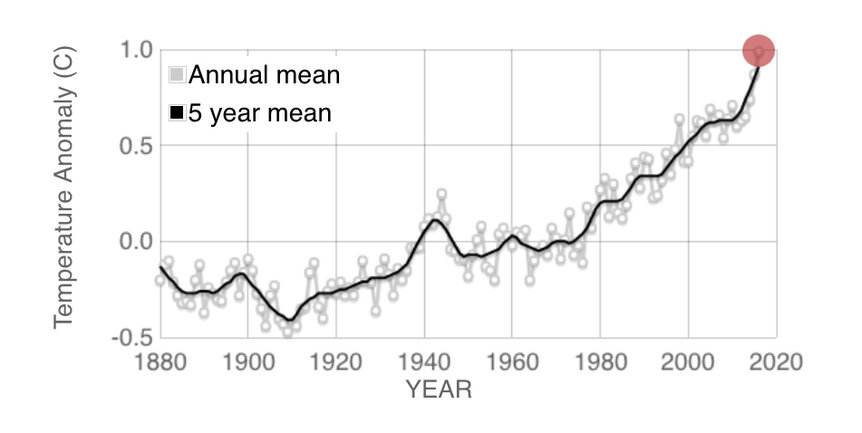Create a free profile to get unlimited access to exclusive videos, sweepstakes, and more!
All the fake news that’s fit to print: Why is The New York Times printing climate science denial?

The New York Times is considered one of the standards of journalism, a newspaper that sets the bar very high for accurate and in-depth reporting.
So, why did they hire a climate science denier to write op-eds for them?
When they announced that Bret Stephens would be published on their Opinions page, there was something of an uproar. He is a conservative, and the Times is more left-of-center, so some static from readers was to be expected. But there’s more: He’s coming from being on the editorial board at The Wall Street Journal, which is notoriously anti-science when it comes to global warming; they have posted a large number of laugh-out-loud ridiculous climate editorials, from claims that warming isn’t real to the forehead-smacking “carbon dioxide is plant food” bull defecaciousness.
When I heard Stephens would be writing for the Times, I was therefore highly skeptical he would give climate science a fair shake. Given his history of attacking both the science and the scientists involved, there was plenty of evidence to think this was a bad idea.
Then, he wrote his first op-ed, and provided even more.
I was going to debunk his specific climate science claims, but happily climate expert Joe Romm does so more than ably at Think Progress. Not only is Stephens' science wrong —and the Times editors should have caught that— but his conclusions are, as well.
For example, he writes,
Claiming total certainty about the science traduces the spirit of science and creates openings for doubt whenever a climate claim proves wrong. Demanding abrupt and expensive changes in public policy raises fair questions about ideological intentions. Censoriously asserting one’s moral superiority and treating skeptics as imbeciles and deplorables wins few converts.
Ignoring for the moment that nearly all the climate science deniers making the rounds in the media do precisely what Stephens accuses climatologists of (what I call “the dark mirror of denial”), he’s simply wrong here. There is much that is certain in climate science, and it has been the single-minded goal of the well-funded denial industry to sow doubt about it. For example, there is no doubt that carbon dioxide is a greenhouse gas. There is no doubt that humans have been dumping tens of billions of tons of it into the air every year. There is no doubt the amount of CO2 has been increasing. There is no doubt that temperatures around the globe are also increasing.
Yet these facts are constantly under attack by climates of various stripes, even the most fundamental ones we’ve known for over a century.
Stephens goes on:
None of this is to deny climate change or the possible severity of its consequences. But ordinary citizens also have a right to be skeptical of an overweening scientism. They know — as all environmentalists should — that history is littered with the human wreckage of scientific errors married to political power.
What Stephens is doing here is a time-honored anti-science tactic: Create doubt when there is none. Cast it as reasonable, even when it isn’t. Amplify that doubt, then say, “Hey, let’s talk about this” as if this opinion has equal bearing as a tsunami of scientific evidence. Feh.
He winds up his premier column with this forehead slapper:
… Perhaps if there were less certitude about our climate future, more Americans would be interested in having a reasoned conversation about it.
This is another easily debunked claim; a large majority of Americans on both sides of the aisle know that global warming is real. If you want evidence of this, why not take a look at an article published by, oh say, The New York Times?
I would suggest that, perhaps if there were less air given to people inappropriately casting doubt about climate science in the media, even more Americans would be interested in doing something about it.
I think my favorite part of all this is when Stephens quotes climate journalist Andy Revkin to support his claims ... and then Revkin, himself, completely rebuts him.
I’ll note that there is some —some— uncertainty about how much the temperature will go up as a function of increased CO2 in the air. That is where a lot of the interesting work in climatology is being done right now. But no matter what, the choices are between bad things happening and very bad things happening. Saying some uncertainty is equal to no certainty at all is what a lot of deniers claim, and Stephens’ first op-ed is paving the road for that kind of argument.
So, in the end, this op-ed by Stephens is well-worn territory, without much new in it. The thing is, anyone who has access to Google could have seen this coming 1.6 kilometers away. I presume the editors at the Times do have such access, so why then did this happen?
It’s not like no one said anything. When the Times announced hiring Stephens, a lot of people (including many climatologists) took to social media to condemn it. So the Times decided to defend the action, saying they were “seeking more voices.”
Having a diversity of voices on an op-ed page is fine (though if you’re looking for diversity, why not look for actual, y’know, diversity?), but having one spout such long-debunked and error-laden nonsense traduces the aim of the Times. There are plenty of conservative voices that are more factually based. Otherwise, why not hire a flat-Earther, or a creationist?
This leaves the question of what to do about it. Many climatologists have canceled their subscriptions to the Times. There’s been something of a public movement online to do this as well, with the hashtag ShowYourCancellation.
I’ve been mulling this over, and talking with some friends online about this. The Times happens to have a very good news team covering climate change, in fact one of the best— which also doesn’t seem too pleased with the hiring of Stephens, either. Canceling a subscription over this in some ways punishes them, and obviously also prevents you from reading their work. But, of course, the idea here is that if enough people cancel, perhaps the editors at the Times will rethink their stance.
I’m not sure that will happen, but I certainly hope it does. We are far, far past the point where we should be giving oxygen to people who sow doubt on the science of warming, just as we are far past the point where we should be discussing just what we're going to do about warming.
Given that the solar power industry alone employs more people than fossil fuel, that the market for alternative energy has been outpacing that of fossil fuel for some time, and these two issues —jobs and market growth— are near and dear to the conservative heart, why not find a voice for that?
I don’t have a subscription to the Times, and if I did I probably wouldn’t cancel it. But I can lend my voice here, and make this issue better known as best I can.
So, Times editors: What will you do now?
Image Credit: M. Shcherbyna / Shutterstock.com



























